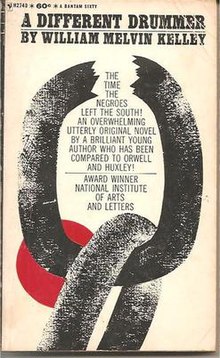A Different Drummer (novel)
 From Wikipedia - Reading time: 3 min
From Wikipedia - Reading time: 3 min

A Different Drummer is the 1962 debut novel of William Melvin Kelley. It won the John Hay Whitney Foundation Award and Rosenthal Foundation Award of the National Institute of Arts and Letters.[1] The title references Henry David Thoreau's lines: "If a man does not keep pace with his companions, perhaps it is because he hears a different drummer..."[2][3]
Story
[edit]June 1957. One afternoon, in the backwater town of Sutton in an imaginary Southern state located between Mississippi and Alabama, a young black farmer, Tucker Caliban, matter-of-factly throws salt on his field, shoots his horse and livestock, sets fire to his house and leaves with his pregnant wife, starting an exodus of the entire African-American population from the state. The novel gives background and context to Caliban's act across a dozen chapters, each told from the perspective of different white townspersons.[4]
Structure
[edit]The original edition starts with an extended dedication (to the author's mother, his father and to "MSL"), and an epigraph (two separate stanzas from Walden by Henry David Thoreau, one of which includes the title of the book). The novel is divided into 11 titled chapters. The narrative is told from the viewpoint of the town's white inhabitants.[4]
Reception
[edit]According to Book Marks, the book received "rave" reviews based on five critic reviews with four being "rave" and one being "positive".[5] In Books in the Media, a site that aggregates critic reviews of books, the book received a ![]()
![]()
![]()
![]()
![]() (5.00 out of 5) from the site which was based on four critic reviews.[6][7]
(5.00 out of 5) from the site which was based on four critic reviews.[6][7]
References
[edit]- ^ Nelson, Emmanuel Sampath, Contemporary African American Novelists, ISBN 0313305013, 1999: "William Melvin Kelley has been a writer in residence at the State University of New York at Geneseo and has taught at the New School for Social Research. He has also been a freelance writer. He won fellowships to the New York Writers' Conference and the Bread Loaf Writers' Conference as well as receiving the John Hay Whitney Foundation Award and Rosenthal Foundation Award of the National Institute of Arts and Letters for his first novel, A Different Drummer."
- ^ Andrews, William L., African American Literature: Voices in a Tradition, 1992, p. 519. ISBN 0030474248. About the Author William Melvin Kelley (b. 1937): "Early in his career, William Melvin Kelley wrote: 'I am not a sociologist or a politician or a spokesman. Such people try to give answers. A writer, I think, should ask questions. He should depict people, not symbols or ideas disguised ...' Kelley's first novel, A Different Drummer, was published in 1962, when he was twenty-five. The title emphasizes the importance of individuality in Kelley's work. It comes from the famous lines of Henry David Thoreau: 'If a man does not keep pace with his companions, perhaps it is because he hears a different drummer...'."
- ^ Hughes, Sarah (October 27, 2018). "Lost literary masterpiece of 1960s black America comes to UK". The Guardian. Retrieved October 27, 2018.
- ^ a b Gilmartin, Sarah (November 17, 2018). "A Different Drummer by William Melvin Kelley: The new 'Stoner'?". The Irish Times. Retrieved January 9, 2019.
- ^ "A Different Drummer". Book Marks. Retrieved 16 January 2024.
- ^ "A Different Drummer Reviews". Books in the Media. Archived from the original on 18 Oct 2021. Retrieved 14 January 2023.
- ^ "A Different Drummer". Bibliosurf (in French). 2023-10-04. Retrieved 2023-10-04.
 KSF
KSF